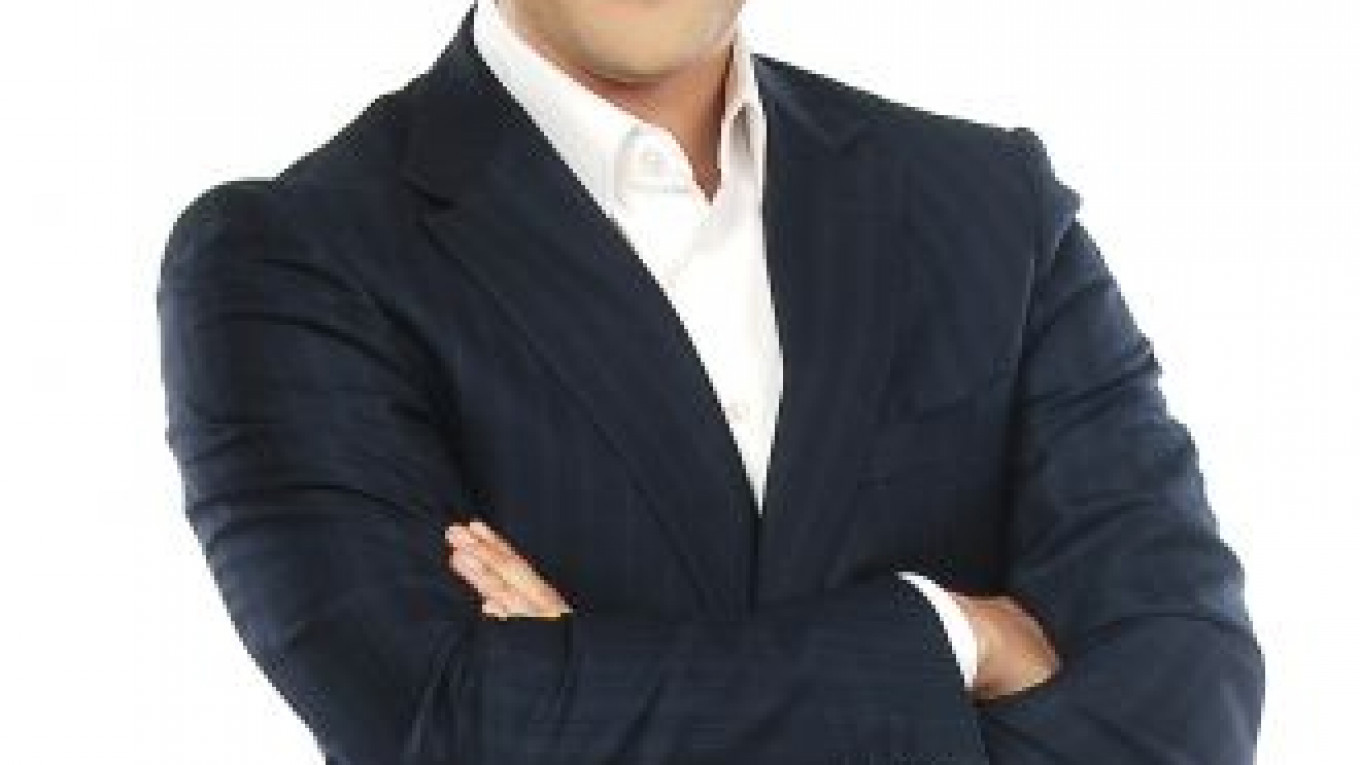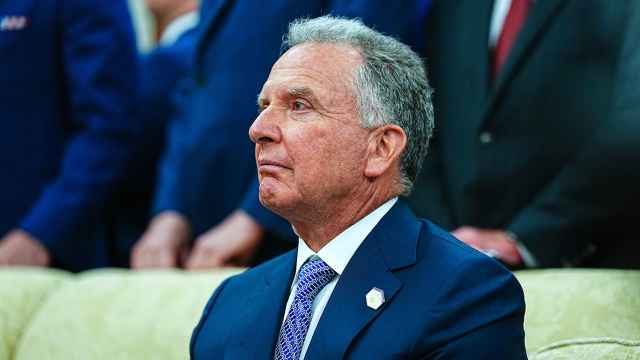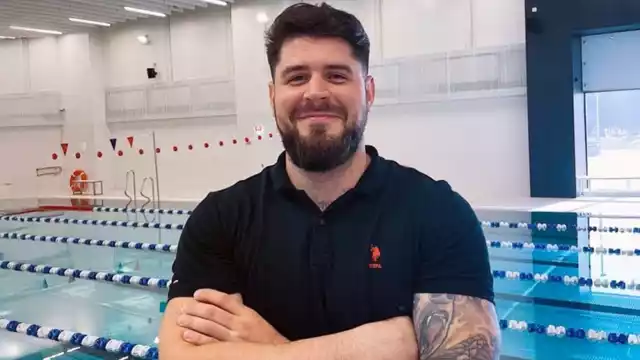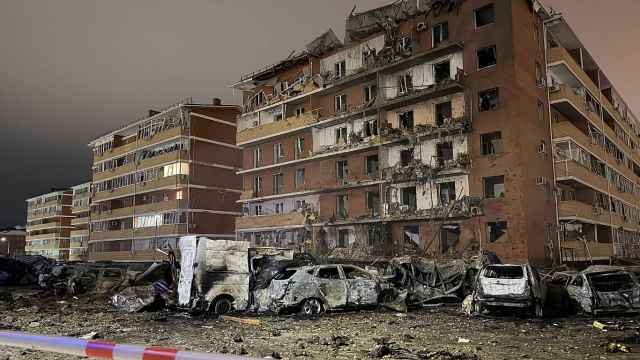Education
1989-1993 — Moscow Institute of Physics and Technology
1994-1996 — Wharton School, University of Pennsylvania
Work Experience
1993-1994 — PepsiCo Holding, financial analyst
1997-1999 — Renaissance Capital, investment banking department
1999-2001 — Saint Petersburg Sea Port, financial director
2001-2003 —National Container Co., president
2003-2004 —TransCare logistics consultancy, general director of Russian branch
2004-2006 — Industrial Investor Group, vice president for strategic development
2006-2012 —Alfa Group, director of portfolio management and control
2012-Present — Foundation for Fighting Corruption, executive director
Favorite book: “The Effective Executive” (1966) by Peter Drucker
Reading now: “IKS” (2012) by Dmitry Bykov
Movie pick: “2001: A Space Odyssey” (1968) directed by Stanley Kubrick and “Mirror” (1975) directed by Andrei Tarkovsky
Many would consider the task of raising money from businessmen who have found wealth and success in modern Russia to bankroll the activities of Alexei Navalny, one of the country's foremost opposition leaders, a hopeless one.
But that is the task to which Vladimir Ashurkov, 40, devotes his time. And he should know what he is up against. Before becoming Navalny's deputy and the head of his Foundation for Fighting Corruption, the diminutive activist was a senior executive at billionaire Mikhail Fridman's Alfa Group.
He was forced out of Alfa Group early this year as the political spotlight shone on Navalny and his supporters amid mass street demonstrations in the run-up to March presidential elections.
Educated at one of the United States' most prestigious business schools, Ashurkov is unique in Navalny's immediate circle as someone with significant experience in the higher echelons of Russian business.
Navalny and Ashurkov are the only members of the Foundation for Fighting Corruption, which has 15 employees, not to receive a salary from the organization. Ashurkov, who spoke in impeccable English slightly better than Navalny's, picked glitzy shopping mall Smolensky Passazh for an interview with The Moscow Times.
A self-conscious newcomer to the ranks of Russia's opposition, he admits to voting for Vladimir Putin in 2004. Five years later, he began reading Navalny's blog, which he describes as a catalyst for his political views.
But his biggest break with the past came in January, when the management at Alfa Bank gave him a choice between business and politics. "The top people at Alfa realized I was a political risk for them," Ashurkov said.
In the end, he chose politics. And in April he became the head of the Foundation for Fighting Corruption, an umbrella body for projects including the tracker of state tenders RosPil, pothole-busting RosYama, election monitor RosVybory and volunteer coordinator Good Vehicle of Truth.
His business acumen also played a role in attracting sponsorship for the cause. In May, Navalny revealed 16 big donors from the business world, including Alfa Group strategic planning director Alexei Savchenko, billionaire Alexander Lebedev and venture capitalist Sergei Filonov.
"He doesn't agree with the real ideology of those Kremlin thieves," Navalny wrote of Ashurkov in June. "There are more and more of these people … but Volodya is one of the first to speak out and not just whisper in corporate corridors."
But his ambitions do not end with managing Navalny's finances. With seven others from the foundation, including Navalny, he is running for election to the opposition movement's Coordination Council later this month.
And he is one of the architects of the People's Alliance, a political party currently seeking official registration. It markets itself as an alternative to today's regime, "the parties in parliament and the old democratic establishment," said Ashurkov. Navalny will be invited to join if registration is successful.
Ashurkov spoke to The Moscow Times about corruption, funding Navalny, jumping from business to politics and the opposition's prospects. The interview has been edited for length and clarity.
Q: How do you choose the companies you target or the corruption scandals you expose?
A: Alexei Navalny began by uncovering major instances of graft within large state-controlled companies. Unfortunately, the managers at such companies are, in many cases, given free rein to use the businesses as their own personal trading machines, as in the case of VTB Bank. Or they dole out contracts to their friends and their cronies. Naturally we focus on these companies.
Q: How do you find big corruption scandals?
A: The majority of the large cases started from analyzing public information. It's usually a mixture of public information and insider tips.
Q: What exactly is your role at the Foundation for Fighting Corruption?
A: From the very beginning, the approach was doing what you can grab from the share of the work, and what you can manage. Now I am responsible for hiring decisions, administrative work, fundraising, and strategizing on our portfolio of projects.
Q: In May, you announced the names of 16 donors backing Navalny. Are they still involved?
A: We gathered about 4 million rubles ($129,000) initially, and some of those initial sponsors turned into regular donors who give on a monthly basis. But most of them just made a one-off contribution. Since then we have added a few more. We don't have a big cash cushion, so every month we have to go out and find more money. This keeps us very agile: We have to justify ourselves to existing donors and to new donors.
Q: How much was raised this year?
A: Our budget is about $40,000 per month, and we have been operating since February. That's our burn rate. About 70 percent of our funding comes from large-ticket donors who give thousands of dollars a month, and about 30 percent comes from small donations of between 500 and a couple of thousand rubles.
Q: Why should people in business support Navalny?
A: The business elite does not like the situation in Russia from a moral and aesthetic point of view. Nobody likes it when you are lied to through state television, or when your vote is stolen. And intelligent people realize that is what is going on. Economically, they have found a way to thrive in this system, but they see the negative impact it is having on economic development: the excessive regulation, enormous government presence in the economy and corruption. And the smartest businessmen understand that if repressive trends continue, their economic interests will be hurt.
The unstable political situation is already shortening the investment horizon. There is so much money to be made in Russia if it were a level playing field. But people don't invest with a long horizon. That affects returns.
And Russian businessmen, when they interact with foreign partners, are becoming stigmatized even if they do not participate in high-level corruption or are not cronies of the Putin regime. When you say you are Russian, you carry with yourself all the weight of the image of Russia, which is perceived as corrupt and, in some cases, as a failed state.
Q: How important is propaganda and PR in what you do — compared with concrete results?
A: Whatever we can get. Public disclosure is a tool of influencing officials because nobody wants his particular activities exposed. In the absence of formal channels, when the Prosecutor General's Office is unwilling to investigate these facts, we have to resort to indirect tactics, like going to the public.
In many cases, though, we are having an impact. Maybe not resulting in jail terms for criminals but in terms of some dismissals. Through RosPil's activities, over 40 billion rubles worth of tenders have been either canceled or amended. And there is a general improvement in how government officials prepare these state tenders — because they know an eye is watching over them.
Q: You voted for Putin as president in 2004. What caused your political convictions to change?
A: My views have naturally evolved. In the early 2000s I saw a lot of liberal reforms – the transportation industry where I was working at the time was changing — and it was reflected in economic growth and a focus on development. We always understood that Russia's legacy was difficult — corruption, inefficiencies — but it seemed like the government was tackling it.
Then, around the time of the Khodorkhovsky case, you understood that the level playing field for business was being disrupted. But I thought that there were good guys and there were bad guys in the government, and you needed to support the good guys. In 2004, on balance, I thought Putin was a better choice.
But over the following years, the political system became more and more repressive. Siloviki strengthened their grasp, and by the 2008 presidential elections I was completely disillusioned with what was going on.
Q: How did you deal with corruption when you were a businessman?
It wouldn't be far from the truth when I say that it is impossible to do business in Russia without corruption. The cases range from the bribe you pay to the fire inspector, to government officials becoming shadow shareholders in major companies in exchange for official favors.
One of the inspirations for my work and ideas on how to reform state-run companies has been the experience of how private companies deal with corruption. When serving on the board of [retail giant] X5, I witnessed how the shareholders took a very uncompromising stance. Dozens of people were fired for various forms of mismanagement on a monthly basis.
I learned that if there is a political will to fight corruption at the top of the company, from the owners and the management, it really can be done, even in the Russian environment, where corruption is endemic.
Q: What advice would you give to foreign investors in Russia?
A: Russia is a large and important market; you cannot ignore it. A lot of foreign investors have made a lot of money here. But you have to be in touch with reality and not naive about how the country is run. Play by the rules and understand the risks. There is no recipe for doing business in a corrupt and authoritarian country like Russia.
Q: How easy was your transition from business to politics?
A: I was always keen on politics, but before I met Alexei I didn't see any effective way to participate. Working in business, you understand that the only thing that matters is results. In helping Alexei I saw that with limited resources he was able to effect changes disproportionate to his resources.
I am still a novice in politics, but I believe I will make my contribution if I work hard and am smart. This approach worked for me in business and should be applicable in public life, too.
Q: There has been a lot of discussion about the opposition shifting its focus to economic and social demands. Is this the right strategic move?
A: Economic issues are, of course, more important to the average Russian than issues of democracy, human rights, political prisoners and so on. I believe that more and more people realize their economic misfortune and the decrepit state of infrastructure that they see around them are linked to political corruption. Local authorities are appointed centrally, and the federal authorities turn a blind eye as they siphon off cash to their private pockets in exchange for achieving the election results for the party in power on election day.
Q: How important are mass demonstrations?
A: Mass protests and demonstrations are just the tip of the iceberg of the processes going on in society. It's naive to judge the level of protest activity by the number of people who come to these rallies.
For me personally, when I go to rallies, the most important things are not what people say from the stage or how many people come. The important thing is to feel that you are not alone. Even 10,000 is a lot of people who, on a snowy or rainy day, decide to take to the streets. You see their faces.
Q: Has some of the momentum of the opposition movement faded?
A: There are no legitimate mechanisms to influence the authorities. We don't have access to mass media, and the legal system is used to stymie the protests and the opposition. Nobody has a recipe to alter this. So it is important to play on different chessboards. Mass protest is one; civil initiatives are another. We give people tools to demand real changes. This raises awareness and empowers people, and they will be less compliant when the authorities try to steal their vote.
Another area is propaganda: publicizing corruption cases and linking economic and political graft. And creating a positive agenda: showing people that opposition leaders, despite all their differences, can coordinate their efforts and achieve results, albeit limited ones.
The name of the game is capturing minds and creating credible alternatives in terms of organizational structures and personalities so that the question of "who if not Putin?" can be answered.
The opposition is weak and fragmented. But I am optimistic because the wave of mass protest started less than a year ago. A year ago, if we were looking at how things are now, we would have considered ourselves quite lucky.
Related articles:
A Message from The Moscow Times:
Dear readers,
We are facing unprecedented challenges. Russia's Prosecutor General's Office has designated The Moscow Times as an "undesirable" organization, criminalizing our work and putting our staff at risk of prosecution. This follows our earlier unjust labeling as a "foreign agent."
These actions are direct attempts to silence independent journalism in Russia. The authorities claim our work "discredits the decisions of the Russian leadership." We see things differently: we strive to provide accurate, unbiased reporting on Russia.
We, the journalists of The Moscow Times, refuse to be silenced. But to continue our work, we need your help.
Your support, no matter how small, makes a world of difference. If you can, please support us monthly starting from just $2. It's quick to set up, and every contribution makes a significant impact.
By supporting The Moscow Times, you're defending open, independent journalism in the face of repression. Thank you for standing with us.
Remind me later.







